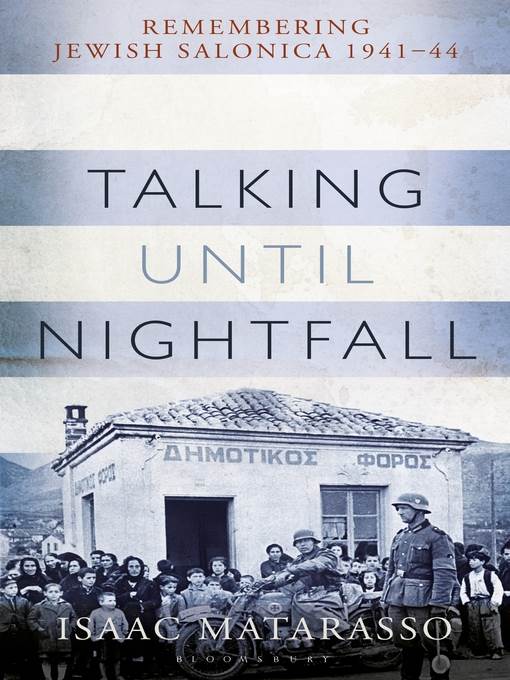
Talking Until Nightfall
Remembering Jewish Salonica, 1941–44
کتاب های مرتبط
- اطلاعات
- نقد و بررسی
- دیدگاه کاربران
نقد و بررسی

May 18, 2020
This powerful collection of Holocaust writings by Greek-Jewish doctor Matarasso (1892–1958), drawn largely from a memoir originally published in Athens in 1948 and augmented with commentary and autobiographical pieces by his family members, bears witness to the Nazi occupation of Salonica (present-day Thessaloniki) in Greece and the near-extermination of the city’s Jewish population. A generous, community-minded dermatologist, Matarasso left the Jewish ghetto for weeks at a time to work for the Greek resistance. As his daughter-in-law and translator, Pauline, notes in the book’s fine introduction, Matarasso’s observations are “both urgent and subtle, measured and hesitant to condemn.” He vividly describes Jewish collaborators “down at the railroad station on deportation days, the regulatory truncheon in hand” as they “harassed the Jewish flock,” and notes that “even the insane from the Jewish asylum are herded aboard , along with disabled soldiers from the Albanian war—legless, armless, feet lost to frostbite.” He also writes about Jewish culture in Greece, and the struggle to rebuild after the war. The book’s final section includes selections from a memoir written by Matarasso’s son, Robert (1927–1982), who offers his own eloquent perspective on some of the events described by his father. This poignant eyewitness account articulates the human cost of the Holocaust.

June 12, 2020
Matarasso was a Jewish physician from Salonica (now Thessloniki, Greece), who fell in love with a Catholic Frenchwoman, Andre�, while completing his education. She joined him after he returned to Salonica; they married and had one son, Robert, whose experiences and memories are also chronicled here. Robert's wife, Pauline Matarasso, translated Robert's writing from Greek, and Robert and Pauline's son, Fran�ois, added his own research and editing to bring the story to life. During World War II, Salonica was overtaken by the Nazis, and while the family was spared the concentration camps, they experienced imprisonment, torture, and deprivation. Yet all three--father, mother, and son--survived, and from that survival arose Isaac's need to record what he'd seen, heard, and done during the war. While he published a small volume of his recollections in Greek and French during his lifetime, adding Robert's memories of the same time period brings something new and unique to this translation. VERDICT A poignant, gripping, and beautiful multigenerational look at life before and during the Holocaust, as well as the process of rebuilding after the war.--Crystal Goldman, Univ. of California, San Diego Lib.
Copyright 2020 Library Journal, LLC Used with permission.

June 1, 2020
Three generations of a Jewish family centered in Salonica reveal their perspectives on the World War II German occupation, which decimated the religious enclave. The primary elements of this unusually constructed text, "the first account of the Shoah available in Greek," appeared in book form in 1948 in Athens, with the title translated into English as And Yet Not All Died. The author was Isaac Matarasso (1892-1958), a doctor who survived the German death camps through a variety of maneuvers, some of which he initiated, others of which can only be described as serendipity or blessed coincidences. As did so many others, Matarasso experienced horrific physical and psychological violence. According to his daughter-in-law, Pauline Matarasso (b. 1929)--the translator of the present volume, which includes contributions from other members of the family as well as additional "more personal pieces" that Isaac wrote--he suffered in ways he almost certainly never fully revealed. Isaac divides his detailed, searing account into three chronological phases: the "partial toleration" of the Germans, aided by turncoat Greeks; the absolute oppression, marked by forced labor and deprivation; and the deportation to the concentration camps: "The Jews were herded like cattle into a concentration camp, where the full range of Nazi brutalities was brought to bear, ending with the deportation of about 46,000 Jews out of the city's population of 50,000, crammed into cattle trucks." Isaac's son Robert (1927-1982) experienced some of the nightmare as a teenager, and his memories are included here in the form of passages from an uncompleted memoir he worked on decades after the invasion. Robert covers many of the same events as his father, but unlike Isaac, he wrote in a more intimate first-person voice. Some readers may be distracted by the fragmented nature of the narrative, but the resurrection and enhancement of the 1948 manuscript is a triumph. A unique Holocaust memoir.
COPYRIGHT(2020) Kirkus Reviews, ALL RIGHTS RESERVED.

























دیدگاه کاربران